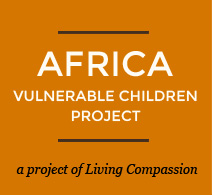WE HAVE WATER! Veronica calls Theresa who calls us. The well diggers call Mr. Chiala. The people in Kantolomba are singing and dancing to welcome the gusher, and we are all grinning ear to ear. This is an inexpressibly big deal. As one of the women said when the well rig drove through the gate onto the property, "This will change Kantolomba." A school changes Kantolomba. Some of the children eating changes Kantolomba. The first-ever clean, safe water of their own is profound change. Only electricity will make a comparable difference--moving these folks from a poor, rural existence to participation in the 21st century, having access to what so much of the rest of the world sees as a given, and using it for their own betterment. It is profound, it is unbelievably exciting, and I hope all reading this will stop for a moment, take a breath and take in the enormous contribution you have made to these people's lives.
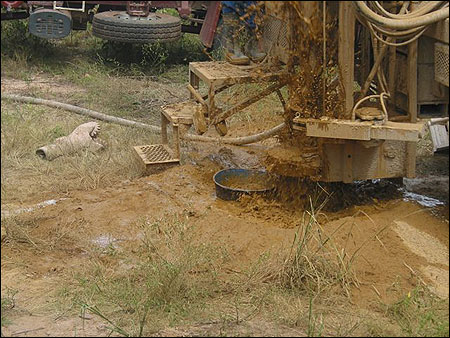
Water coming up from the well.
All other plans get back-burnered so we can race over to the Tropical Diseases Research Center to arrange for the water to be tested. But no, we will ask Theresa to stop there on her way over to us. A while later she arrives with the bad news. The Center needs a formal letter of request (fortunately, they sent us an example of the language), which must be typed and submitted to them. Then they will have one of their staff go to the well, get a water sample, return it to the lab, and 24 hours later we can pick it up. Noooooooooooo! The well rig needs to be somewhere else. Mr. Chiala has already told us we don't need to test the water, it's always good; the amount of rock they have to go through guarantees a good source. (Not being trusting types, we are going for the test.)
At the hospital we delivered the letter and met Bobby, who again explained the procedure. Yes, it will take 48 hours to complete the analysis. Is there another way? Can we speed up the process? No, that's how long it takes. Can we get the sample ourselves? Well, okay. Whew! Bobby gets us the bottles and away we go. (I think they say yes just to get us to go away and stop yammering at them.)
We stopped at the hardware store to pick up the twine to tie to the bottles that will be lowered into the well to get the sample of the water. We untangled the twine and turned it into one long strand (our kite-flying days served us well), tied the end of the string to one of the bottles and prepared to slog through the swamp area around the well site to drop it into the hole. "No," the well fellow told us, "it won't fit." Of course, we had just came from the water testing office where they gave us specific instructions on how to collect the sample. "We will flush the well and catch the water in a bucket." Oh, dear. Can we try to put the bottle down the shaft? "No, it won't fit." Okay, we give up. Flush the thing and we will hope the sample meets the standards of the water testers.
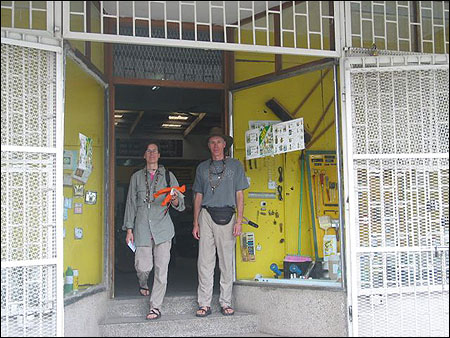
Dave and Jen emerging from the hardware store.
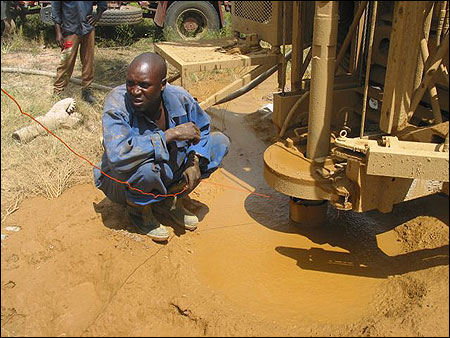
Attempting to fit the bottle down the shaft.
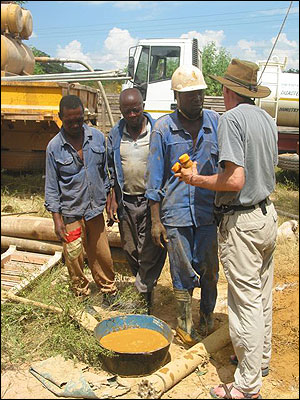
Dave with the sample bottles.
Theresa started feeling ill while we were out at Kantolomba and went home to bed after visiting the clinic for a quick malaria test. Blessedly, the test came back negative, but she needed to spend the day resting. Even if it wasn't malaria, she's still sick.
Our next order of business was to pay our respects to the Permanent Secretary. She is a civil servant and holds the second highest position in the province. The only person of higher rank is the Provincial Minister, an elected position. Alas, she wasn't back from the meeting she had been attending. The good news was that her deputy met with us, and then took us to meet the Provincial Minister. He is a charming individual who spoke with us at length of his concerns about development and opportunity for all the citizens of the Copperbelt region, about the growth that is currently taking place, and of his hopes for the inclusion of the poor in that development and expansion. He expressed appreciation for the work we're doing in such a poverty-stricken area as Kantolomba and assured us of his assistance and support. We were disappointed not to get to meet the Permanent Secretary and very happy and grateful to have such a productive meeting with the Minister.
With a sick driver, we were once again pedestrians. Fortunately, we were in town and able to do things like get more kwacha from the ATM, check on the internet--still down--and make phone calls. Endless phone calls. What in the world did we do before cell phones? We are grateful to have the Savoy as our office in Ndola. (Everywhere we go people ask us where we are headquartered and we point at the cell phone.)
Tomorrow will be a day, hopefully, of tying up some loose ends. Seeing another Guest House for the July trip, thanking the head of the water department for facilitating the well, checking in with the lawyer about the house bid, seeing Dr. Chalwe (TDRC) and meeting Dr. Kakungu at District Health Management, picking up yet more chitenge, sliding by the crafts market for some ideas for products we might carry through Keep It Simple as part of our growing micro-business program, meeting Gaudencia for the building quote, catching up with Bruce (from OPIC), picking up the results from the water test, and maybe getting internet access.
